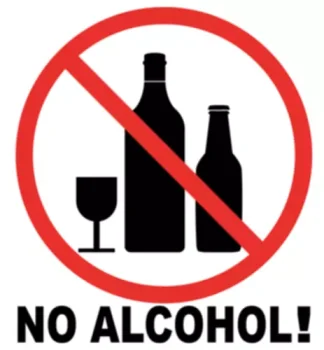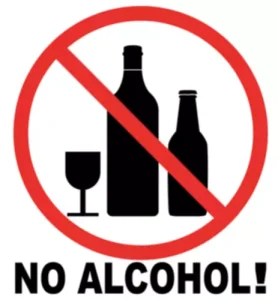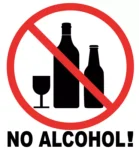
You do not have to give up alcohol entirely to create a calorie deficit. Instead, changing your drinking habits can help you manage your weight. Cocktails and mixed drinks often have more calories than beer and wine. For example, a piña colada has as many as 500 calories per seven-ounce serving. Research has found that elevated cortisol levels may increase abdominal weight gain. Cortisol redistributes fat tissue to your abdominal region and increases cravings for high-calorie foods.

Health topics
Overall, the available experimental evidence reviewed in this article suggests that moderate intake of alcohol does not lead to weight gain. The systematic review by Bendsen et al. 3• suggests that this trend is less likely in experimental studies examining beer consumption exclusively. A modest increase in weight of one kilogram over a 10 week period seems insignificant but over five years this could result in up to 26 kg of weight gain if no compensation takes place. To our knowledge, there does not appear to be any experimental evidence specifically testing the effects of heavy/binge drinking, or of drinking spirits or a combination of alcohol sources on weight gain/obesity. A summary of the studies examined in this article, organized by the trend between alcohol and weight gain/obesity can be found in Table 1.

Your immune system may weaken if you drink vodka every night in excess
If you drink too much, your liver can’t break down the alcohol, and you can end up with a hangover the next day. Generally, one fluid ounce of 80-proof vodka contains about 64 calories, while a 1.5-ounce shot of vodka contains 96 calories. This is slightly less than a similar-sized glass of wine, which usually has 125 calories per serving. Vodka also has no carbohydrates, making it a preferred option for many people =https://ecosoberhouse.com/ trying to cut out those calories.
- Other types of alcohol, like vodka or red wine, can also contribute to weight gain if consumed in excess.
- In addition, drinking while pregnant may result in fetal alcohol syndrome disorders (FASDs).
- Of the 17 studies reviewed by Yeomans, ten showed increased food intake following alcohol consumption 5.
- Data was drawn from the Health Professionals Follow-Up Study and adjusted for age, lifestyle/diet changes, and cardiovascular risk factors.
Calorie Content of Vodka
Given that both excessive alcohol intake and obesity are of public health concern, a better understanding of the association between alcohol consumption and excess body weight is warranted. In summarizing the recent literature it appears that light-to-moderate alcohol intake is less likely to be a risk factor for obesity than heavy drinking. Heavy drinking and binge drinking have been more consistently linked with adiposity. Another important confounding factor to be considered is physical activity level. Furthermore, beer and spirit drinkers appear to have poorer dietary habits in general than wine drinkers 3•. Thus, accounting for both sides of the energy balance equation (intake, expenditure and lifestyle habits) is crucial to evaluate adequately the association between alcohol intake and obesity.

The Skinny on Alcohol: How to Drink and Avoid Weight Gain
Drinking alcohol can impair the functions of your glands that release hormones, which may cause weight gain. If you’re watching your waistline, many lower-calorie mixers keep the flavor intact—try seltzer water or light tonic, or sip yours neat with just a splash of club soda or lime juice. When it comes to an understanding the impact of alcohol on your waistline, it all boils down to calories. All types of alcohol contain calories, and the calories found in vodka are no exception. Click here to read more about the effects of alcohol on health on does alcohol make you gain weight MDLinx.

Alcohol can cause weight gain and have a negative impact on the body. Long-term effects of alcohol include weight gain from its high calories and low nutritional value. Many alcoholic drinks, such as wine, beer, and liquor, are made by fermenting natural starches and sugars. While alcohol doesn’t necessarily affect everyone the same way, it can cause some people to gain weight due to its high-calorie content and the way it affects metabolism, hunger-hormones, and decision making. Do you ever have problems falling asleep at night no matter how tired you are or how busy your day was? Have you turned to drinking a shot of vodka every night at bedtime to help you relax and best your insomnia?
Does Alcohol Slow Metabolism? Here’s What You Need To Know
Plus, the fact that alcohol—frustratingly—doesn’t require nutritional labeling can make it even more challenging for the average person to discern just how many calories they are consuming from their drinks. Observational studies on the effect of alcohol intake on obesity date back almost 30 years 6. It has been examined across small and large cohorts, in many countries, across various ethnicities and age groups 4. Within the large body of observational research, contradictory findings exist, which warrant further exploration 3•, 4.
If you drink vodka every night, you could increase your risk for cancer
The slow development of obesity and multi-faceted nature of this condition really complicates the possibility to show a cause-and-effect association between alcohol consumption and weight gain. Thus, we need to rely on short-term intervention studies and epidemiologic studies, each of which has clear limitations in showing an effect of alcohol intake on the vulnerability to gain weight. However, the preponderance of the evidence taken as a whole suggests that alcohol may be a risk factor for obesity in some individuals, especially when consumed in large quantities. The truth is that all alcoholic beverages come with calories and potential health risks. Vodka can be enjoyed in moderation like any other alcoholic beverage. However, as with all alcohol consumption, it’s important to consider the impacts of weight gain.

Well, that can have both good and bad effects, according to registered nurse James Cobb. “If you drink a moderate amount Drug rehabilitation of vodka before bed it might cause you to fall asleep faster and to sleep deeper,” he shared with The List. “Unfortunately, the sleep won’t be of the highest quality.” So while it’s certainly better than no sleep at all, the sleep you’ll get after drinking won’t be as good as old-fashioned natural sleep. Generally, you must consume fewer calories than you use to lose weight.
